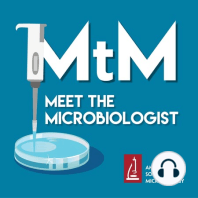24 min listen

MTS33 - Abigail Salyers - The Art of Teaching Science
MTS33 - Abigail Salyers - The Art of Teaching Science
ratings:
Length:
21 minutes
Released:
Aug 13, 2009
Format:
Podcast episode
Description
Abigail Salyers is a Professor of Microbiology and the G. William Arends Professor of Molecular and Cell Biology at the University of Illinois at Urbana-Champaign, and her research focuses on the ecology of microorganisms in the human body and the comings and goings of antibiotic resistance genes, particularly genes in Bacteroides species. Dr. Salyers is ASM’s 2009 Graduate Microbiology Teaching Awardee. If you’ve ever tried teaching or mentoring, you know it’s not always easy, but for an eminent scientist, teaching at the undergraduate or graduate level must be incredibly difficult. After all, once you reach a certain level of knowledge in any field, it can be hard to relate your knowledge to people who know relatively little about it. Dr. Salyers has tackled 100-level biology courses with as many as 300 students, taught one-on-one at the lab bench, and been an instructor at an intensive summer course in microbial diversity, all while rising to the top of her field in research. In this interview, I talked with Dr. Salyers about the most influential teacher in her own life (you might be surprised to learn who that is), about whether antibiotic resistance is getting the kind of play it deserves, and about why the baboon vagina is an interesting study system.
Released:
Aug 13, 2009
Format:
Podcast episode
Titles in the series (100)
MTS20 - Roberto Kolter - Bacillus Subtilis and Bacteria as Multicellular Organisms: Roberto Kolter is a professor of Microbiology and Molecular Genetics at Harvard Medical School. Dr. Kolter’s research interests are broad, but he says his eclectic program boils down to an interest in the ecology and evolution of microbes, bacteria in p by Meet the Microbiologist